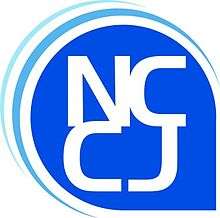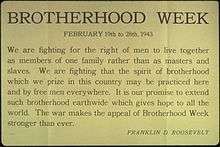National Conference for Community and Justice

The NCCJ was founded in 1927 as the National Conference of Christians and Jews, in response to anti-Catholic sentiment being expressed during Al Smith's run for the Democratic nomination. Its founders included prominent social activists such as Jane Addams and U.S. Supreme Court Justice Charles Evans Hughes who dedicated the organization to bringing diverse people together to address interfaith divisions. Several years later, the NCCJ expanded its work to include all issues of social justice including race, class, gender equity, sexual orientation and the rights of people with different abilities.
In the 1990s, the name was changed to the National Conference for Community and Justice to better reflect the breadth and depth of its mission, the growing diversity of the country and the need to be more inclusive.
Their stated mission is promoting "inclusion and acceptance by providing education and advocacy while building communities that are respectful and just for all."[1]
Programs and events
Through its youth and adult programming, the NCCJ works with students, teachers, clergy, corporate, and civic leaders to facilitate workshops, develop curriculum, convene race relations and inter-religious dialogues, and provide consulting on challenges related to bias, bigotry, and racism.
ANYTOWN
ANYTOWN is the NCCJ's premiere youth program, and has existed for over 50 years in America. Many similar programs (in name and content) emerged across the country, including Metrotown and Unitown. ANYTOWN is designed to educate, liberate, and empower youth participants (ages 14–18) to become effective, responsible leaders and community builders in a global society. ANYTOWN brings together a diverse group of students and counselors to learn to identify the many "isms" in our society, including racism, sexism, antisemitism, heterosexism, classism, cissexism, and ableism. Students examine in-depth prejudice and its byproduct discrimination, enhance their communication skills, and prepare to take their knowledge and skills into their schools and communities to make them more just and inclusive for all.
The year-long program launches with a week-long social justice residential experience focusing on prejudice reduction, community building and leadership for high school age youth.
Bridges
Bridges is a two-day anti-bullying, prejudice reduction, self-esteem building program for middle and high school students.
YAC (Youth Action Coalition)
The Youth Action Coalition is a group run by and for youth to increase their understanding and develop action around social justice issues.
Different and the Same
Different and the Same is an elementary school program where teachers are trained to use curriculum consisting of videos and activities to address the challenging issues of bias and differences.
Interfaith Programs
NCCJ’s interfaith programs are designed to promote understanding and respect among all religions and philosophical beliefs.
NCCJ Workplace
NCCJ also offers customized training for corporations, organizations and educational institutions doing business in today’s multicultural world that look at the systems of oppression and privilege, enhances communications skills, builds cultural competences and creates more inclusive work environments. Topics include, but are not limited to; Race, Gender, LGBTQ, Abilities, Class, and more.
Walk as One
Walk as One is an annual community walk-a-thon. Each walk-a-thon is held in a major urban area, and serves to spotlight NCCJ's efforts in each community in which it serves. Preceding, during, and following the walk-a-thon itself is a one- to two-hour open air gathering which involves area vendors, music performances, side entertainment and non-profits.
History
In 1927, The New York Times announced the founding of the National Conference of Christians and Jews by community leaders from different faiths including Jane Addams, U.S. Supreme Court Chief Justice Charles Evans Hughes, and Benjamin N. Cardozo. The founders were committed to bringing diverse people together to address interfaith divisions, race relations, and social and economic barriers among people of different faiths, cultures, and ethnicities.

The Tolerance Trio, consisting of Minister Dr. Everett Ross Clinchy, Rabbi Morris Samuel Lazaron, and Father John Elliot Ross, traveled across America in 1933, calling all people to embrace intergroup understanding. The Trio covered over 9,000 miles, visiting 129 audiences around the country. One year later, President Franklin D. Roosevelt launched the precursor of Brotherhood/Sisterhood Week, held annually during the third week in February (originally Feb. 19-28, 1943), as its first Honorary Chairman. NCCJ sponsored the week-long event from the 1940s through the 1980s. Tom Lehrer satirized the idea in his song of the same name, recorded on That Was the Year That Was. During the second World War, the NCCJ religious trio provided spiritual guidance to the armed forces, reaching over eight million enlistees.
In the 1950s, the NCCJ began its award-winning residential youth leadership institutes, including their ANYTOWN program, all of which are still offered across America. In addition to ANYTOWN, programs such as the Brotherhood/Sisterhood Camp, Mini-Town, MetroTown, It's Your Move, Unitown, Building Bridges, Camp Odyssey, and Knowledge and Social Responsibility were formed during this time, helping to spread the NCCJ's message across the country.
President John F. Kennedy commended the NCCJ in 1961 for doing more than "perhaps any other factor in our national life to provide for harmonious living among our different religious groups." In 1977, the NCCJ led a nationwide series of institutes on the Holocaust, leading to an Act of Congress establishing the National Holocaust Remembrance Week. Nearly a decade later, the organization established the precursor to today's Seminarians Interacting initiative. In 1994, the NCCJ issued a groundbreaking nationwide survey of attitudes on intergroup relations called Taking America's Pulse.
One year later, the NCCJ started a series of nationally telecast National Conversations on Race, Ethnicity, and Culture at the Library of Congress. Partnering with Aetna, Inc., these Conversations were created to enlighten people about the various cultures that exist within society, to encourage and broaden dialogue among people who have limited interaction with those of different backgrounds, and to create more welcoming environments in the workplace and society at large.[2]
At the White House's request, the organization convened faith leaders and began a long-term racial reconciliation in 1998. Two years later, the NCCJ issued its second nationwide survey of attitudes on intergroup relations, Taking America's Pulse II. Today, the NCCJ's mission, as it has been in the past, is to eliminate all forms of prejudice, bigotry, and discrimination. The organization's programming, research, and public policy efforts are directed at transforming our communities to make them more inclusive and just for all.
Transition
Since its founding in 1927, the NCCJ has operated within a national unitary model of regional chapters in as many as 60 cities in 22 states. In 2005, the NCCJ moved from a unitary structure of governance to independent, autonomous regions to better respond to the dynamic environment of change faced by most non-profits today.
Headquartered in New England, NCCJ continues to draw upon its proud tradition of championing the cause of social justice for all and its mission of fighting bias, bigotry and racism in all its forms and to work toward building strong and inclusive communities.
Corporate partners
NCCJ has effective networking skills which have enable them to secure partnerships with several corporations to help further its initiatives. Partners have included Aetna, ING, the MetLife Foundation, Prudential, Federal Express, and Darden Restaurants.
See also
References
- Notes
- ↑ National Conference for Community and Justice. "Our Story"
- ↑ One America - National Conversation on Race, Ethnicity, and Culture "National Conversations on Race, Ethnicity, and Culture"
External links
- National Conference for Community and Justice
- Members of the National Federation for Just Communities
- National Conference for Community and Justice of Metropolitan St. Louis (NCCJSTL)
- "Aims to harmonize national groups" New York Times (December 11, 1927)
- Washington Post; July 19, 1964; "Lewis Webster Jones, president of the National Conference of Christians and Jews since 1958, will retire from the post next June. He will be succeeded by a six-man committee"
- Tom Lehrer; Video performance of song titled "National Brotherhood Week"